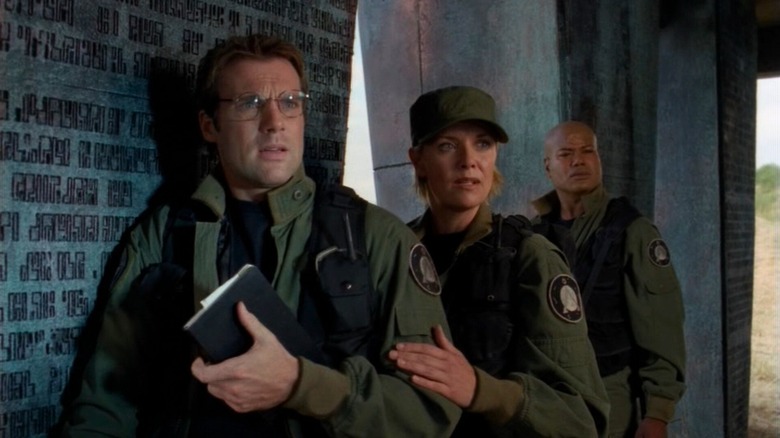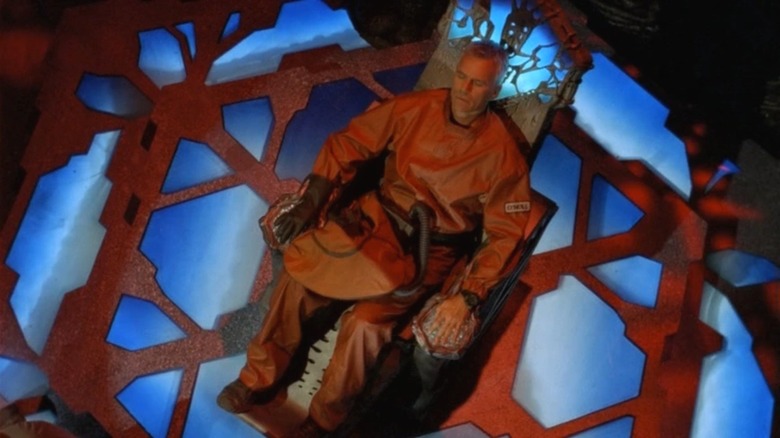
MGM Television
Brad Wright and Jonathan Glassner's "Stargate SG-1" had a great run. The Syfy show ran for 10 seasons between 1997 and 2007 and chronciled the adventures of the titular S-1 special operations team, which used a Stargate device (an intergalactic portal of sorts) to travel to alien worlds. The show had no shortage of material to draw from in its earliest seasons either; it incorporated aspects of everything from Arthurian legend to Norse mythology, spinning fantastical yet grounded stories along the way.
However, by the time the sixth season rolled around, the "SG-1" writers had begun worrying about the show's longevity. For starters, its episodic themes had started to feel stale (for more on that, see the lowest-rated "SG-1" episode on IMDb). Moreover, the series' tight budget severely limited options for filming locations, which were mostly confined to the woods of British Columbia. Given the futuristic nature of the show, it became increasingly difficult for "SG-1" to dress up places on Earth and pretend that what you were seeing was part of an alien planet. On top of all that, Richard Dean Anderson, who portrayed series lead Colonel Jack O'Neill, was considering moving on, which was yet another reason why the show's writers decided to being telling their stories in a different format.
As a result, in 2001, Wright and scriptwriter Robert C. Cooper contemplated making a "Stargate SG-1" feature film, which would act as a bridge between the Syfy show and a new spin-off series down the line. However, these plans fell through and the plot for the feature got morphed into season 7's two-part finale. These episodes, titled "Lost City," premiered in 2004 and provided the narrative foundation for "Stargate Atlantis," which was the "Stargate" spin-off series that Wright and Cooper had intended to make all along. So, what happened? Let's investigate further.
Stargate SG-1's Lost City finale was initially conceived as a feature film

MGM Television
Cooper spoke at length about the repurposed "Stargate SG-1" feature with Dial the Gate in 2023, explaining that the original idea was that the "SG-1" crew would discover the Lost City of Atlantis after stumbling upon an alien spaceship submerged in the ocean during one of their missions. This story was considered substantial enough to warrant turning it into a theatrical feature, with the intention being that the film would also plant the seeds for a future spin-off series as part of the "Stargate" franchise. This would simultaneously deal with the issue of "SG-1" cast members leaving the show, as a fresh crew of explorers would then help steer the property toward a new direction.
After these plans were discussed, Cooper and Wright met Bonnie Hammer, the president of the Syfy channel at the time (at Universal Television), and pitched these ideas to her. As Cooper recalled:
"We pitched the whole thing out to her [Hammer]. We had kind of had some inkling that it was probably going to happen no matter what we said, that this was maybe a bit of a formality. She's like 'Oh yeah, that's great,' and we said, 'And then, 'Lost City' would be the transition from 'SG-1' to 'Atlantis.” And she was like, 'Oh no no, we're going to do both!' And that was the first time we'd heard that. We were both like 'What?' We had talked all about essentially ending 'SG-1' at the end of season 7. [Richard Dean Anderson] had been talking about really 'time to move on' and 'enough of O'Neill' and that type of thing."
As Hammer was interested in continuing "Stargate SG-1," the idea of a theatrical movie was remodeled into the "Lost City" episodes and the series ultimately lived on for several more seasons. Thankfully, the intended spin-off series still got made, with "Stargate Atlantis" running for five seasons and the "Lost City" two-parter serving as a crucial turning point in the "Stargate" franchise's sprawling lore.
"Stargate SG-1" is currently streaming on Pluto TV.









 English (US) ·
English (US) ·